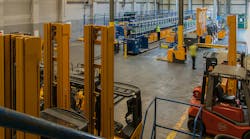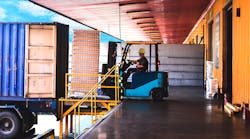If you’ve never thought much about what goes on at our nation’s ports, I urge you to start. What’s happening at our East and West Coast gateways is the clearest demonstration of material handling logistics’ importance to our nation’s well being than anything else I can imagine.
Last month, West Coast longshoremen and the major shipping lines started clashing over efforts to modernize the ports. The shipping lines want to automate, and thus speed the flow of freight into our nation’s supply chains. The dock workers union, on the other hand, is worried about losing jobs to automation.
The automation that’s causing such a ruckus involves the use of electronic records generated in Asian ports to detail what’s being carried in a container. Union clerks now retype this information. The union is also worried about what happens if shipping lines start electronically organizing how containers are stacked. Computers could also help truckers navigate through shipping yards for a faster turnaround.
We all know what buggywhip makers thought about Henry Ford’s invention, but this 21st century fear of technology goes beyond nuisance. It’s downright dangerous. It’s also the opposite mindset of material handlers on the opposite coast.
The container operations at the Port of New York-New Jersey will join the ports of Antwerp, Rotterdam, and Felixstowe (UK) in securing some of the most critical tradelanes coming into the United States. These ports will soon be linked with container handling operations on the East Coast through a real-time information platform, providing better assurances that containers are not carrying bombs, chemicals or even terrorists. Interoperable technologies will include radio frequency identification (RFID) electronic seals and readers, GPS tracking systems, and gamma-ray image scanners — all seamlessly linked to security application software through the Universal Data Appliance Protocol (UDAP).
How would the West Coast Luddites I mentioned react to this news? Would they see it as an insidious way to monitor their productivity? To track their movements? To threaten their jobs?
I trust not. I would hope they’d agree with the president of the Port Newark Container Terminal who said “Stoppage of any single major port in the world due to an attack would shut down the entire global supply chain for weeks, costing trillions of dollars.” We saw what the West Coast stoppage did to supply chains across the country during just the first few days of the port strike. That alone could have been enough to spoil this coming holiday season for many retail supply chains. The longer such strikes go on, the more cumulative the consequences.
And what if a terrorist organization decided to use confusion at the ports to their advantage? Just planting the rumor of a hidden nuclear bomb at a port of entry could be enough to slow port traffic and disrupt JIT assembly operations across the country.
Material handling logistics technology was always transparent to consumers around the world. Managers who’ve used it to guarantee service to these customers were likewise taken for granted. It’s a shame that it took labor unrest on the West Coast and terrorism on the East Coast to spotlight the strategic importance of jobs like yours.
You may not be able to affect what happens on either coast, but I hope you’re doing something to improve the state of your supply chain.
Tom Andel, chief editor, [email protected]


